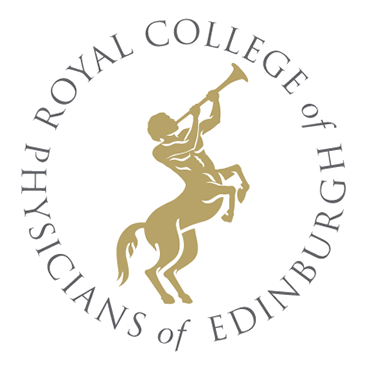
The Consultation Letters of Dr William Cullen (1710-1790) at the Royal College of Physicians of Edinburgh
[ID:4611] From: Dr William Cullen (Professor Cullen) / To: Dr Colin Ross / Regarding: Mr John Parish (J.P.; Mr P.) (Patient) / 14 April 1783 / (Outgoing)
Reply to Dr Colin Ross about 'your patient' (John Parish). Cullen discusses the patient's case as being one of 'catarrhus vesicae', with reference to the works of Lieutaud and Hoffmann. He advises on the preparation of Bearberry leaves and how to give the dosage of Copaiva Balsam with sugar.
- Facsimile
- Normalized Text
- Diplomatic Text
- Metadata
- Case
- People
- Places
Facsimile
There are 6 images for this document.
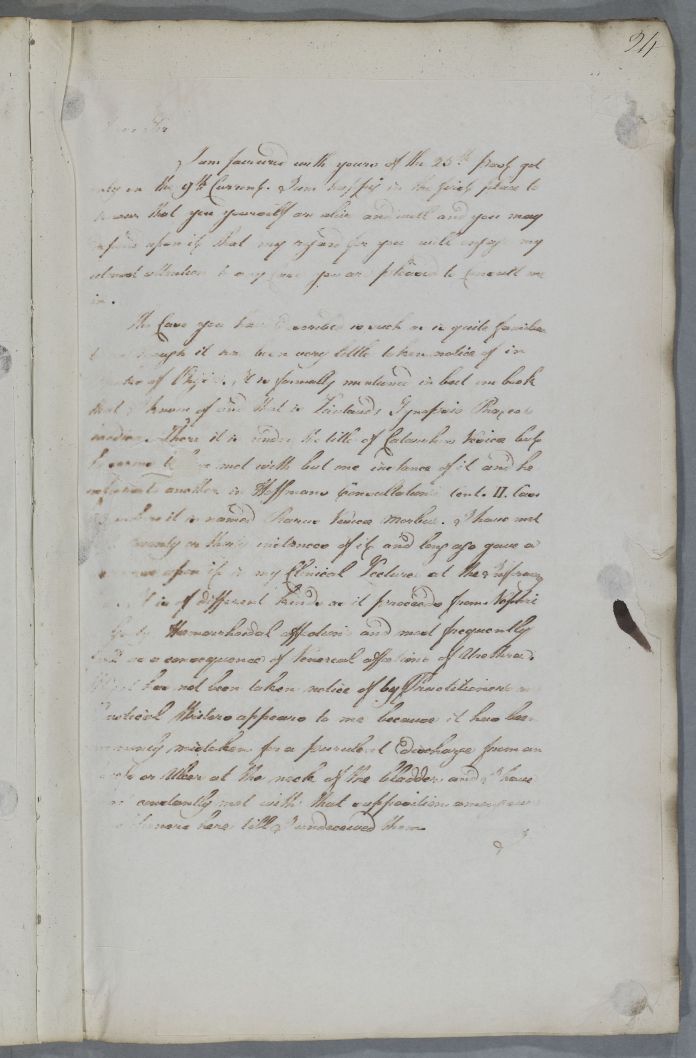
[Page 1]
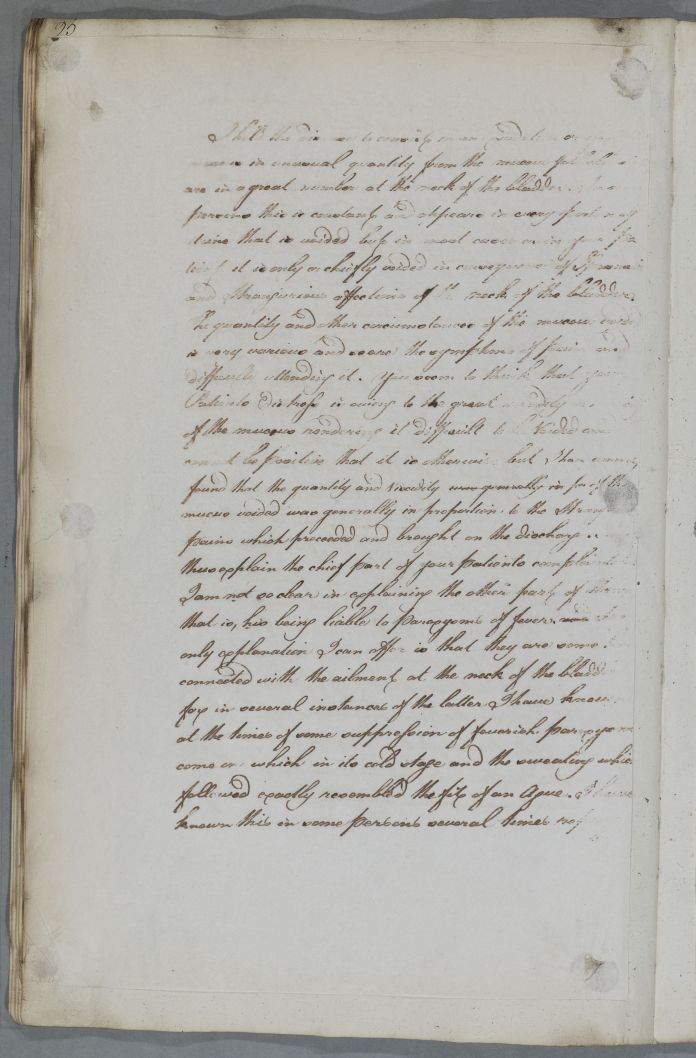
[Page 2]
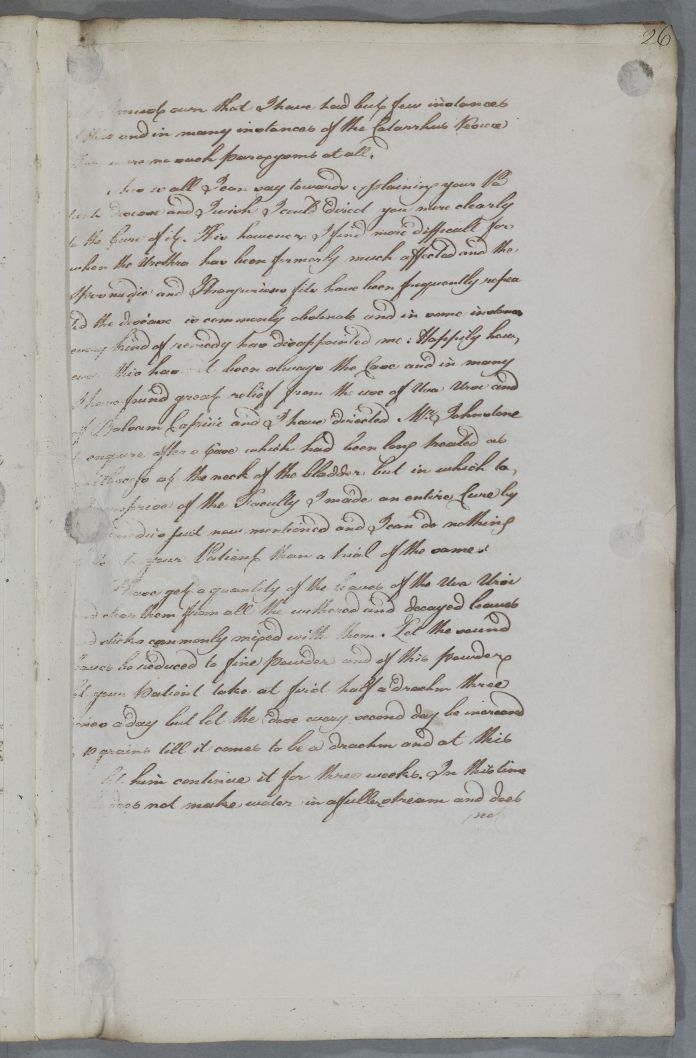
[Page 3]
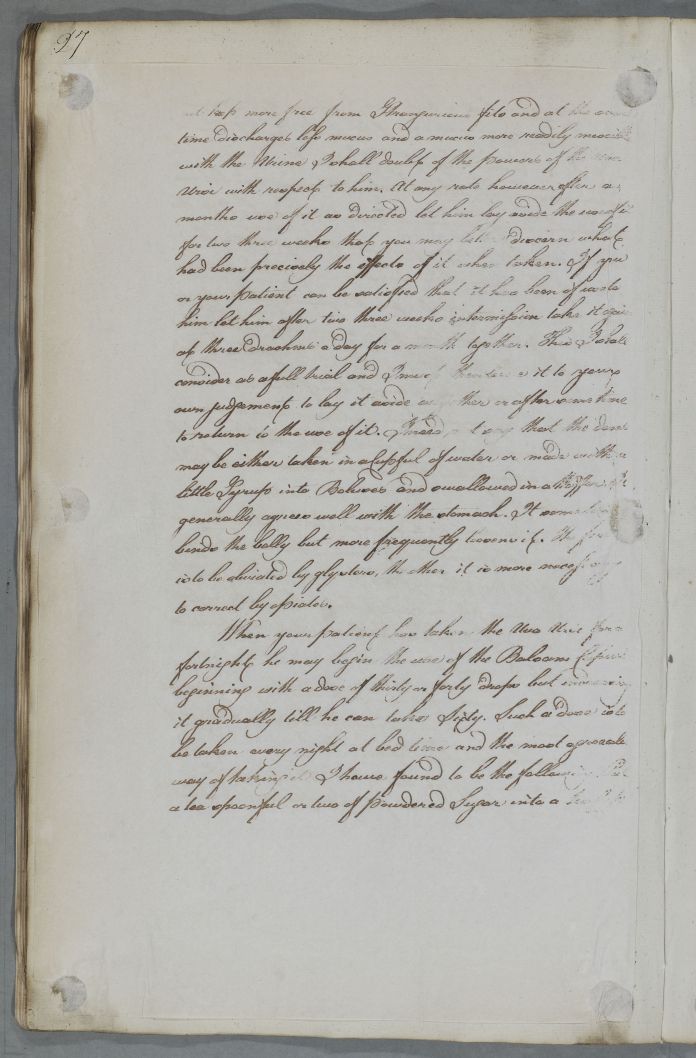
[Page 4]
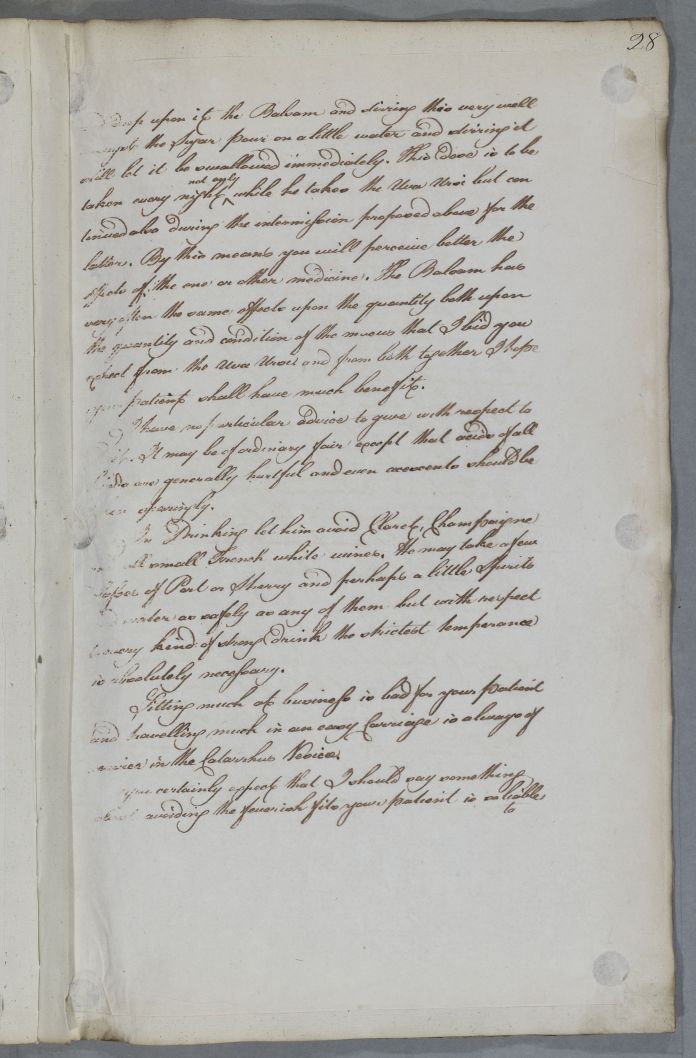
[Page 5]
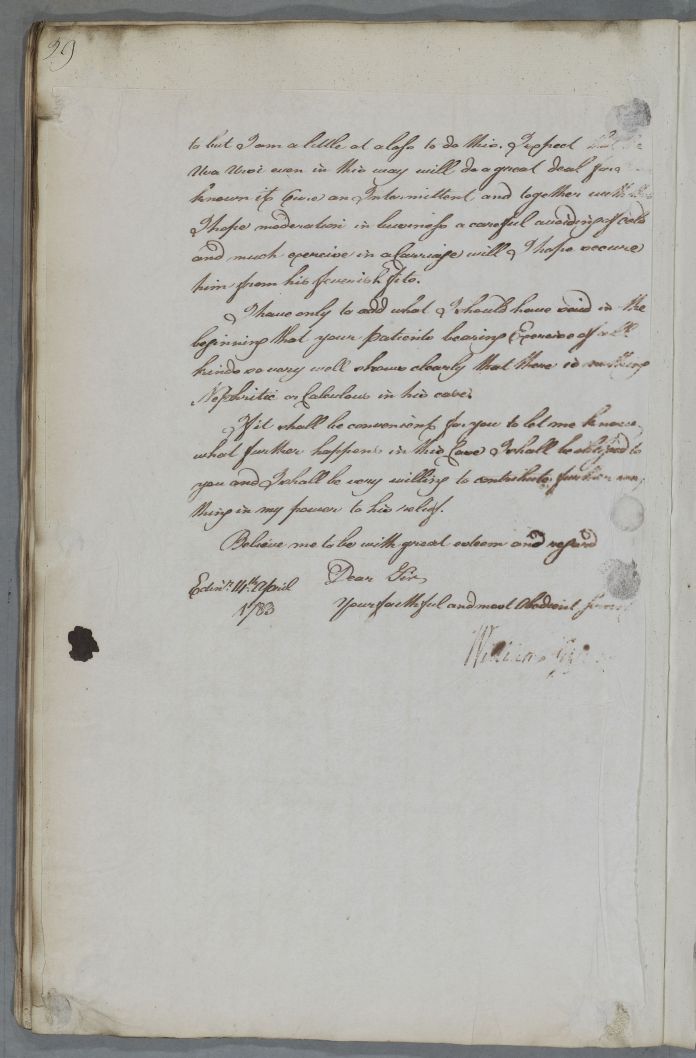
[Page 6]
Metadata
| Field | Data |
|---|---|
| DOC ID | 4611 |
| RCPE Catalogue Number | CUL/1/1/16/16 |
| Main Language | English |
| Document Direction | Outgoing |
| Date | 14 April 1783 |
| Annotation | None |
| Type | Machine scribal copy |
| Enclosure(s) | No enclosure(s) |
| Autopsy | No |
| Recipe | No |
| Regimen | No |
| Letter of Introduction | No |
| Case Note | No |
| Summary | Reply to Dr Colin Ross about 'your patient' (John Parish). Cullen discusses the patient's case as being one of 'catarrhus vesicae', with reference to the works of Lieutaud and Hoffmann. He advises on the preparation of Bearberry leaves and how to give the dosage of Copaiva Balsam with sugar. |
| Manuscript Incomplete? | No |
| Evidence of Commercial Posting | No |
Case
Cases that this document belongs to:
| Case ID | Description | Num Docs |
|---|---|---|
| [Case ID:1664] |
Case of 'J. P.' [identified as likely being John Parrish] an unnamed male patient with a urinary disorder as reported by Colin Ross in Hamburg. |
4 |
People linked to this document
| Person ID | Role in document | Person |
|---|---|---|
| [PERS ID:1] | Author | Dr William Cullen (Professor Cullen) |
| [PERS ID:2968] | Addressee | Dr Colin Ross |
| [PERS ID:3613] | Patient | Mr John Parish (J.P.; Mr P.) |
| [PERS ID:2968] | Patient's Physician / Surgeon / Apothecary | Dr Colin Ross |
| [PERS ID:1] | Patient's Physician / Surgeon / Apothecary | Dr William Cullen (Professor Cullen) |
| [PERS ID:1201] | Other Physician / Surgeon | Dr Joseph Lieutaud |
| [PERS ID:2872] | Other Physician / Surgeon | Dr Friedrich Hoffmann (Hoffman) |
| [PERS ID:3617] | Other | Reverend David Johnstone (Johnston; Dr Johnstone) |
Places linked to this document
| Role in document | Specific Place | Settlements / Areas | Region | Country | Global Region | Confidence |
|---|---|---|---|---|---|---|
| Place of Writing | Cullen's House / Mint Close | Edinburgh | Edinburgh and East | Scotland | Europe | certain |
| Destination of Letter | Hamburg | Germany | Germany | Europe | inferred |
Normalized Text
I am favoured with yours of the 25th. past got
only on the 9th. Current. I am happy in the first place to
know that you yourself are alive and well and you may
depend upon it that my regard for you will engage my
utmost attention to any Case you are pleased to Consult me
in.
The Case you have described is such as is quite familiar
to me though it has been very little taken notice of in
[Books?] of Physic. It is formally mentioned in but one book
that I know of and this is Lieutauds Synopsis Praxeo
medicæ. 1 There it is under the title of Catarrh of the Bladder but
he seems t[o hav]e met with but one instance of it and he
[refers?] to another in Hoffmans Consultations Cento II. Case
{illeg} [where?] it is named Rare Disease of the Bladder. 2 I have met
[with] twenty or thirty instances of it and long ago gave a
[lecture] upon it in my Clinical Lectures at the Infirmary
It is of different kinds as it proceeds from Nephric
Gouty, Hæmorrhoidal affections and most frequently
all are a consequence of Venereal affections of Urethra.
[Why it?] has not been taken notice of by Practitioners and
[Practical?] Writers appears to me because it has been
[commonly?] mistaken for a purulent discharge from an
[abcess?] or Ulcer at the neck of the bladder and I have
{illeg} constantly met with that supposition among our
[practitioners here till I undeceived them?]
[Page 2]
I hold the disease to consist in an exsudation or {illeg}
{illeg} in unusual quantity from the mucous [follicles which?]
are in a great number at the neck of the bladder. [In some?]
persons this is constant and appears in every portion of
urine that is voided but in most cases as in your Pa¬
tient it is only or chiefly voided in consequence of Spasmodic
and Strangurious affections of the neck of the bladder.
The quantity and other circumstances of the mucous voided
is very various and so are the symptoms of pain and
difficulty attending it. You seem to think that your
Patients distress is owing to the great viscidity or {illeg}
of the mucous rendering it difficult to be voided and
must be positive that it is otherwise but I have [commonly?]
found that the quantity and viscidity was generally in p of the
mucus voided was generally in proportion to the Strang[urious]
pains which preceeded and brought on the discharge. [While?]
these explain the chief part of your patients complaints
I am not so clear in explaining the other part of them,
that is, his being liable to paroxysms of fever, and The
only explanation I can offer is that they are some how
connected with the ailment at the neck of the bladder,
for in several instances of the latter I have known
at the times of some suppression of feverish paroxysm[s]
come on which in its cold stage and the sweating whic[h]
followed exactly resembled the fit of an Ague. I have
known this in some persons several times repea[ted]
[Page 3]
and I must own that I have had but few instances
of this and in many instances of the Catarrh of the Bladder
there are no such paroxysms at all.
This is all I can say towards explaining your Pa¬
tients disease and I wish I could direct you more clearly
to the Cure of it. This however I find more difficult for
when the Urethra has been formerly much affected and the
spasmodic and Strangurious fits have been frequently repea¬
ted the disease is commonly obstinate and in some instances
every kind of remedy has disappointed me: Happily how¬
ever this has not been always the Case and in many
I have found great relief from the use of Bearberry and
of Balsam Capivi and I have directed Mr. Johnstone
to enquire after a Case which had been long treated as
an abcess of the neck of the bladder but in which to
[the surprise?] of the Faculty I made an entire Cure by
[the remedies?] just now mentioned and I can do nothing
[better?] to your Patient than a trial of the same.
Please get a quantity of the leaves of the Bearberry
and clean them from all the withered and decayed leaves
and sticks commmonly mixed with them. Let the sound
leaves be reduced to fine powder and of this powder
let your patient take at first half a drachm three
times a day but let the dose every second day be increased
[by] 10 grains till it comes to be a drachm and at this
[amount] let him continue it for three weeks. In this time
[if he?] does not make water in a full stream and does
[Page 4]
not keep more free from Strangurious fits and at the same
time discharges less mucus and a mucus more readily mixed
with the Urine I shall doubt of the Powers of the Bearberry with respect to him. At any rate however after a
months use of it as directed let him lay aside the use of it
for two or three weeks that you may better discern what
had been precisely the effects of it when taken. If you
or your patient can be satisfied that it has been of use to
him let him after two three weeks intermission take it again
at three drachms a day for a month together. This I shall
consider as a full trial and I must then leave it to your
own judgement to lay it aside altogether or after some time
to return to the use of it. I need not say that the doses
may be either taken in a Cupful of water or made with a
little Syrup into Boluses and swallowed in a Waffer. It
generally agrees well with the stomach. It sometimes
binds the belly but more frequently loosens it. The [former?]
is to be obviated by glysters, the other it is more necessary
to correct by opiates.
When your patient has taken the Bearberry for a
fortnight he may begin the use of the Balsam Capivi
beginning with a dose of thirty or forty drops but increasing
it gradually till he can take sixty. Such a dose is to
be taken every night at bed time and the most agreeab[le]
way of taking it I have found to be the following. Put
a tea spoonful or two of powdered Sugar into a teaCup
[Page 5]
and drop upon it the Balsam and stiring this very well
amongst the Sugar pour on a little water and stirring it
still let it be swallowed immediately. This dose is to be
taken every night ↑not only↑ while he takes the Bearberry but con¬
tinued also during the intermission proposed above for the
latter. By this means you will perceive better the
Effects of the one or other medicine. The Balsam has
very often the same effects upon the quantity both upon
the quantity and condition of the mucus that I bid you
expect from the Bearberry and from both together I hope
your patient shall have much benefit.
I have no particular advice to give with respect to
Diet. It may be of ordinary fair except that acids of all
kinds are generally hurtful and even acescents should be
[taken?] sparingly.
In Drinking let him avoid Claret, Champaigne
and all small French white wines. He may take a few
glasses of Port or Sherry and perhaps a little Spirits
and water as safely as any of them but with respect
to every kind of strong drink the strictest temperance
is absolutely necessary.
Sitting much at business is bad for your patient
and travelling much in an easy Carriage is always of
service in the Catarrh of the Bladder.
You certainly expect that I should say something
about avoiding the feverish fits your patient is so liable
[Page 6]
to but I am a little at a loss to do this. I expect that the
Bearberry even in this way will do a great deal for [I have?]
known it cure an Intermittent and together with this
I hope moderation in business a careful avoiding of cold
and much exercise in a Carriage will I hope secure
him from his feverish fits.
I have only to add what I should have said in the
beginning that your patients bearing Exercise of all
kinds so very well shows clearly that there is nothing
Nephritic or Calculous in his case.
If it shall be convenient for you to let me know
what further happens in this Case I shall be obliged to
you and I shall be very willing to contribute further any
thing in my power to his relief.
Dear Sir
Your faithful and most Obedient Servant
1783
Notes:
1: By the French physician Joseph Lieutaud (1703-1780), published in two volumes at Amsterdam in 1765.
2: Cullen's early research was influenced by the writings of the German physician Friedrich Hoffmann (1660-1742). The reference is rather obscure, but Cullen may indicate Hoffmann's Observationum Physico-chymicarum selectiorum Libri III (Halle: 1722).
Diplomatic Text
I am favoured with yours of the 25th. past got
only on the 9th. Current. I am happy in the first place to
know that you yourself are alive and well and you may
depend upon it that my regard for you will engage my
utmost attention to any Case you are pleased to Consult me
in.
The Case you have described is such as is quite familiar
to me though it has been very little taken notice of in
[Books?] of Physic. It is formally mentioned in but one book
that I know of and this is Lieutauds Synopsis Praxeo
medicæ. 1 There it is under the title of Catarrhus Vesicæ but
he seems t[o hav]e met with but one instance of it and he
[refers?] to another in Hoffmans Consultations Cento II. Case
{illeg} [where?] it is named Rarus Vesicæ morbus. 2 I have met
[with] twenty or thirty instances of it and long ago gave a
[lecture] upon it in my Clinical Lectures at the Infirmary
It is of different kinds as it proceeds from Nephric
Gouty, Hæmorrhoidal affections and most frequently
all are a consequence of Venereal affections of Urethra.
[Why it?] has not been taken notice of by Practitioners and
[Practical?] Writers appears to me because it has been
[commonly?] mistaken for a purulent discharge from an
[abcess?] or Ulcer at the neck of the bladder and I have
{illeg} constantly met with that supposition among our
[practitioners here till I undeceived them?]
[Page 2]
I hold the disease to consist in an exsudation or {illeg}
{illeg} in unusual quantity from the mucous [follicles which?]
are in a great number at the neck of the bladder. [In some?]
persons this is constant and appears in every portion of
urine that is voided but in most cases as in your Pa¬
tient it is only or chiefly voided in consequence of Spasmodic
and Strangurious affections of the neck of the bladder.
The quantity and other circumstances of the mucous voided
is very various and so are the symptoms of pain and
difficulty attending it. You seem to think that your
Patients distress is owing to the great viscidity or {illeg}
of the mucous rendering it difficult to be voided and
must be positive that it is otherwise but I have [commonly?]
found that the quantity and viscidity was generally in p of the
mucus voided was generally in proportion to the Strang[urious]
pains which preceeded and brought on the discharge. [While?]
these explain the chief part of your patients complaints
I am not so clear in explaining the other part of them,
that is, his being liable to paroxysms of fever, and The
only explanation I can offer is that they are some how
connected with the ailment at the neck of the bladder,
for in several instances of the latter I have known
at the times of some suppression of feverish paroxysm[s]
come on which in its cold stage and the sweating whic[h]
followed exactly resembled the fit of an Ague. I have
known this in some persons several times repea[ted]
[Page 3]
and I must own that I have had but few instances
of this and in many instances of the Catarrhus Vesicæ
there are no such paroxysms at all.
This is all I can say towards explaining your Pa¬
tients disease and I wish I could direct you more clearly
to the Cure of it. This however I find more difficult for
when the Urethra has been formerly much affected and the
spasmodic and Strangurious fits have been frequently repea¬
ted the disease is commonly obstinate and in some instances
every kind of remedy has disappointed me: Happily how¬
ever this has not been always the Case and in many
I have found great relief from the use of Uva Ursi and
of Balsam Capivi and I have directed Mr. Johnstone
to enquire after a Case which had been long treated as
an abcess of the neck of the bladder but in which to
[the surprise?] of the Faculty I made an entire Cure by
[the remedies?] just now mentioned and I can do nothing
[better?] to your Patient than a trial of the same.
Please get a quantity of the leaves of the Uva Ursi
and clean them from all the withered and decayed leaves
and sticks commmonly mixed with them. Let the sound
leaves be reduced to fine powder and of this powder
let your patient take at first half a drachm three
times a day but let the dose every second day be increased
[by] 10 grains till it comes to be a drachm and at this
[amount] let him continue it for three weeks. In this time
[if he?] does not make water in a full stream and does
[Page 4]
not keep more free from Strangurious fits and at the same
time discharges less mucus and a mucus more readily mixed
with the Urine I shall doubt of the Powers of the uva
ursi with respect to him. At any rate however after a
months use of it as directed let him lay aside the use of it
for two or three weeks that you may better discern what
had been precisely the effects of it when taken. If you
or your patient can be satisfied that it has been of use to
him let him after two three weeks intermission take it again
at three drachms a day for a month together. This I shall
consider as a full trial and I must then leave it to your
own judgement to lay it aside altogether or after some time
to return to the use of it. I need not say that the doses
may be either taken in a Cupful of water or made with a
little Syrup into Boluses and swallowed in a Waffer. It
generally agrees well with the stomach. It sometimes
binds the belly but more frequently loosens it. The [former?]
is to be obviated by glysters, the other it is more necessary
to correct by opiates.
When your patient has taken the Uva Ursi for a
fortnight he may begin the use of the Balsam Capivi
beginning with a dose of thirty or forty drops but increasing
it gradually till he can take sixty. Such a dose is to
be taken every night at bed time and the most agreeab[le]
way of taking it I have found to be the following. Put
a tea spoonful or two of powdered Sugar into a teaCup
[Page 5]
and drop upon it the Balsam and stiring this very well
amongst the Sugar pour on a little water and stirring it
still let it be swallowed immediately. This dose is to be
taken every night ↑not only↑ while he takes the Uva Ursi but con¬
tinued also during the intermission proposed above for the
latter. By this means you will perceive better the
Effects of the one or other medicine. The Balsam has
very often the same effects upon the quantity both upon
the quantity and condition of the mucus that I bid you
expect from the Uva Ursi and from both together I hope
your patient shall have much benefit.
I have no particular advice to give with respect to
Diet. It may be of ordinary fair except that acids of all
kinds are generally hurtful and even acescents should be
[taken?] sparingly.
In Drinking let him avoid Claret, Champaigne
and all small French white wines. He may take a few
glasses of Port or Sherry and perhaps a little Spirits
and water as safely as any of them but with respect
to every kind of strong drink the strictest temperance
is absolutely necessary.
Sitting much at business is bad for your patient
and travelling much in an easy Carriage is always of
service in the Catarrhus Vesicæ.
You certainly expect that I should say something
about avoiding the feverish fits your patient is so liable
[Page 6]
to but I am a little at a loss to do this. I expect that the
Uva Ursi even in this way will do a great deal for [I have?]
known it cure an Intermittent and together with this
I hope moderation in business a careful avoiding of cold
and much exercise in a Carriage will I hope secure
him from his feverish fits.
I have only to add what I should have said in the
beginning that your patients bearing Exercise of all
kinds so very well shows clearly that there is nothing
Nephritic or Calculous in his case.
If it shall be convenient for you to let me know
what further happens in this Case I shall be obliged to
you and I shall be very willing to contribute further any
thing in my power to his relief.
Dear Sir
Your faithful and most Obedient Servant
1783
Notes:
1: By the French physician Joseph Lieutaud (1703-1780), published in two volumes at Amsterdam in 1765.
2: Cullen's early research was influenced by the writings of the German physician Friedrich Hoffmann (1660-1742). The reference is rather obscure, but Cullen may indicate Hoffmann's Observationum Physico-chymicarum selectiorum Libri III (Halle: 1722).
XML
XML file not yet available.
Feedback
Send us specfic feeback about this document [DOC ID:4611]
Please note that the Cullen Project team have now disbanded but your comments will be logged in our system and we will look at them one day...

